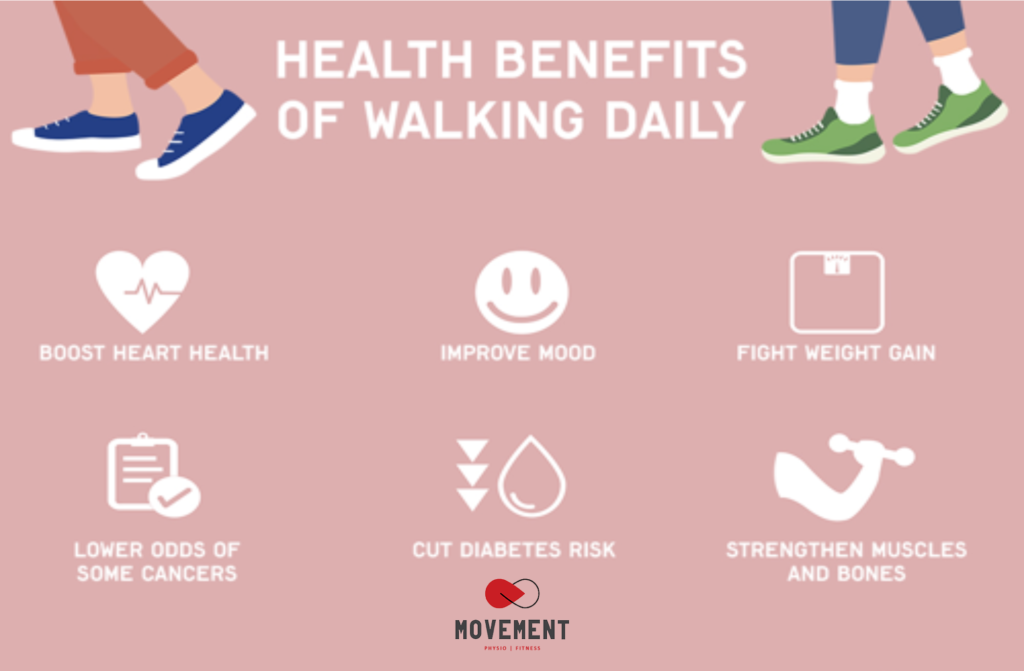Walking daily is not just a simple task but a powerful tool for maintaining health and well-being, regardless of age. It’s a readily accessible activity that can be seamlessly integrated into your daily routine, empowering you to take control of your physical and mental health.
By aiming for about 30 minutes of walking each day, you’re not just improving your physical health but also enhancing your mental well-being. Whether you walk to work, with a friend, or as part of a hiking club, you’re embarking on a journey that can lower your blood pressure, decrease your risk of severe health problems, and even sharpen your mind and boost your mood. The multitude of benefits walking offers should inspire you to make it a part of your daily routine.
Walking is a universally accessible activity that people of all fitness levels can enjoy. Whether you’re a seasoned athlete or just starting your fitness journey, walking is for you. “It’s great for your immune system, speeds up your metabolism, and strengthens your joints, muscles, and bones. It’s also fantastic for reducing stress and giving you some time to yourself,” says Austin.
Here are the esteemed experts behind the advice: Denise Austin, a renowned fitness expert with over 30 years of experience; Melina B. Jampolis, M.D., a respected diet and fitness author who has appeared on numerous T.V. shows; Ariel Iasevoli, a certified personal trainer in New York City who has trained celebrities and athletes; and Michele Stanten, a certified fitness instructor and walking coach with a wealth of knowledge in the field.
Read on to learn about the many benefits of walking and what you can expect when walking for just half an hour on most days.

A closer look at its benefits
1. Improves your mood: Walking isn’t just good for your body; it’s great for your mood, too. Dr. Jampolis explains that even a quick 10-minute walk can significantly lift your spirits. Studies have found that walking can alter your nervous system, reducing anger and hostility, mainly when you walk in natural, green settings. Moreover, social walking—like strolling with a friend or partner—can boost your emotional well-being by helping you feel more connected.
2. Aids in weight control and metabolic health: Regular walking helps with losing weight and maintaining a healthy weight, notes Dr. Jampolis. It can help you slim down your waist without drastically changing your scale reading by improving your body’s response to insulin. For those looking to increase their calorie burn, Denise Austin recommends incorporating hills and varying your pace during walks. Ariel Iasevoli points out that consistent walking, especially over varying terrain, can boost your metabolism by burning extra calories and preventing muscle loss as you age.
3. Enhances cardiovascular health: Walking is fantastic for your heart. It has been shown to lower blood pressure and reduce the risk of cardiovascular events such as heart attacks and strokes. Research indicates that with every additional 1,000 steps per day, you can lower your systolic blood pressure by around 0.45 points. Regular walkers who meet physical activity guidelines can reduce their risk of cardiovascular issues by up to 30% compared to those less active.
4. Lowers risk of several chronic diseases: Walking regularly can decrease your likelihood of developing several chronic diseases. A “Nature Medicine” study reported that daily steps can significantly lower risks for obesity, sleep apnea, and type 2 diabetes. Walking improves overall disease prevention, with the American Diabetes Association recommending it to help manage and prevent diabetes. Notably, walking for just two minutes after eating has been shown to lower blood sugar levels effectively.
5. Reduces stress and enhances mental health: Walking can be a powerful stress reliever. According to Joyce Shulman, walking lowers cortisol levels, the hormone associated with stress, leading to feelings of relaxation. Studies have shown that walking just 10 minutes can alleviate anxiety and depression while enhancing focus and Creativity. Furthermore, walking in nature rather than in urban settings can have even more significant benefits for mental health, significantly reducing activity in brain areas involved in stress processing.
6. Improves your sleep: Regular physical activity like walking can enhance your sleep quality. This improvement is linked to increased melatonin, which helps you sleep. Studies, including one from 2019, show that people who engage in moderate exercise, such as walking, tend to sleep better than those who don’t exercise. Walking improves sleep duration and alleviates stress and pain, which can interfere with a good night’s rest.
7. Boosts your brainpower: Walking isn’t just good for your body; it sharpens your mind. Research has found that regular walking, especially brisk walking for an hour three times a week, can enhance brain functions such as decision-making. This boost could be due to increased blood flow to your brain during exercise, helping it to function better as you age.

8. Alleviates joint pain: Though counterintuitive, walking can relieve joint pain. It improves blood circulation to your joints and strengthens muscles around them, enhancing mobility and flexibility. Studies indicate that walking at least 10 minutes a day can help prevent arthritis pain and keep older adults free from disability.
9. Delays the onset of varicose veins: Walking can reduce your risk of developing varicose veins. Dr Al-Misky explains that walking enhances the ‘second heart’—a circulatory system in the calves and feet that helps push blood back to the heart. Regular walking strengthens this system, maintaining healthy leg muscles and promoting blood flow, which can prevent or delay varicose veins.
10. Stimulates your digestive system: Walking can be more beneficial for your digestion than your morning coffee. Walking activates the muscles in your abdomen, stimulating your gastrointestinal system. This is why it’s often recommended for patients recovering from abdominal surgery to walk, as it helps get the bowels moving again.
11. Kickstart your immune system: Walking, boosts your immune function by increasing the activity of cells that fight off pathogens. Regular walking can reduce your likelihood of falling severely ill from infections and shorten hospital stays if you get sick. A study highlighted that regular walkers could lower their risk of dying from pneumonia significantly compared to non-walkers.
12. Protect your bones: Walking strengthens your bones, particularly in your legs, hips, and lower spine. The Mayo Clinic notes that walking helps maintain bone density, preventing osteoporosis as you age. Research in PLOS ONE suggests that brisk walking for 30 minutes three times a week is particularly beneficial for premenopausal women to prevent bone density loss.
13. Enhance creativity: Feeling stuck? Take a walk. A 2014 study found that walking boosts Creativity. During the research, participants performed better on creative thinking tests while walking than sitting. Dr. Jampolis recommends walking as a simple tactic to unlock a more innovative mindset.
14. Make other goals seem more attainable: Regular walking establishes a routine, making it easier to adopt other healthy habits. Walking can lead to more confidence in meeting health goals, especially as it’s an accessible form of exercise for all ages. Further studies support that regular walkers tend to have a more positive view of their health and mental well-being.
15. Live longer: Walking could help extend your lifespan. Research shows that just 10 to 59 minutes of moderate exercise, like walking each week, can reduce mortality risk by 18%. Those who meet the 150-minute weekly exercise recommendation may see a 31% reduction in mortality risk. Studies also suggest that the faster you walk, the greater the benefits for longevity.
How many steps should you walk every day?
While the famous goal is 10,000 steps a day, research indicates that fewer steps can also provide significant health benefits. A study found that 7,000 steps daily could reduce mortality in middle-aged people. In contrast, another study showed that walking just 4,400 steps a day for older women significantly lowered mortality rates compared to less active peers. This shows that every step counts towards improving your health and longevity.
Optimizing your walking routine
Walking faster can significantly boost your health benefits, lowering risks for mortality and cardiovascular diseases. A brisk pace—around 4 miles per hour—is ideal, as highlighted by a 2019 study published in the Mayo Clinic Proceedings. But how do you develop a solid walking routine?

Building your walking routine
Albert Matheny, R.D., C.S.C.S., advises starting small to build a durable exercise foundation. If you’re new to regular exercise, walk a mile daily. As your fitness improves, gradually increase your distance and pace. For those already active, you might start with three miles a day and accelerate from there.
Challenging yourself
It would help to keep pushing your limits as you get comfortable with your routine. If walking outdoors, try varying your speed and adding longer distances. If you prefer the treadmill, experiment with the incline and occasionally increase the speed, but always maintain good posture to avoid strain.
Incorporating light hand weights intermittently during your walk can also enhance your workout. Alternate a minute of walking without weights with a minute with weights to increase the intensity of your exercise.
Essential gear
All you really need for walking is a sturdy pair of shoes. Choose shoes that offer good support and are suited for long distances. Keep an eye on the wear of your shoes—replacing them after every 300 to 500 miles ensures maximum support and cushioning.
Conclusion
Walking is a remarkably versatile and practical exercise that enhances physical health and boosts mental well-being. It’s accessible, easy to start, and can be adapted to fit any lifestyle or fitness level. By walking faster and more purposefully, you can maximize the extensive health benefits walking offers—from reducing your risk of chronic diseases to improving sleep and boosting brain power. Commit to your walking routine, and enjoy the path to a healthier life. Every step is towards better health, so take that first step today and keep moving forward.

Add your first comment to this post